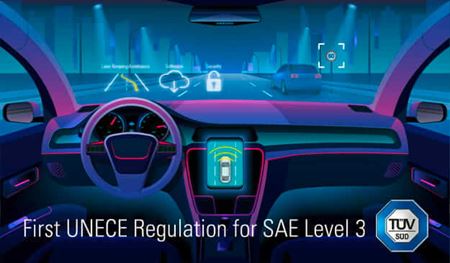
3 August 2020
The United Nations Economic Commission for Europe (UNECE) has adopted an international regulation for automated lane keeping systems (ALKS). For the first time ever, 42 states have agreed on uniform provisions for the type approval of an automated driving function (SAE Level 3). The ALKS correspondingly ensures that drivers temporarily hand full control over to the vehicle. To establish the basis for this UNECE regulation, the UNECE simultaneously passed regulations for cybersecurity and software updates. TÜV SÜD experts support automotive manufacturers and suppliers in all areas of automated driving by providing third-party services, accompanying the process of vehicle and component development right from the start.
 “We explicitly welcome the fact that adoption of these three UNECE regulations now enables us to move from SAE level 2 to SAE level 3 for the first time. These regulations, harmonised at international level, now provide manufacturers with reliable guidance for the development of automated driving functions in all major international markets. Overall, the fact that 42 states have agreed on this regulation is an important indicator of the future viability of automated driving”, says Christian Gnandt, TÜV SÜD Vice President Automated Driving.
“We explicitly welcome the fact that adoption of these three UNECE regulations now enables us to move from SAE level 2 to SAE level 3 for the first time. These regulations, harmonised at international level, now provide manufacturers with reliable guidance for the development of automated driving functions in all major international markets. Overall, the fact that 42 states have agreed on this regulation is an important indicator of the future viability of automated driving”, says Christian Gnandt, TÜV SÜD Vice President Automated Driving.
What have the signatory states agreed on? The scope of the UNECE regulation for ALKS is limited to passenger cars with up to eight seats plus driver and a maximum speed of 60 km/h. At travelling speeds of 60 km/h and less, the automated driving function controls the lateral and longitudinal movements of the vehicle on highway-like roads, keeping it in its lane without the need of driver input. While the system drives automatically in SAE Level 3, drivers no longer need to keep their hands on the steering wheel or otherwise prove attentiveness. Given this, a significant number of the provisions in this regulation refer to the monitoring of driver behaviour. After all, steps must be taken to ensure that drivers are able to take back control within a defined period of time if prompted to do so by the ALKS. The core elements and true innovations are the human-machine interface and the requirement that the system monitors the human driver.
TÜV SÜD’s experts support vehicle manufacturers and suppliers in implementing the new UNECE regulations, providing services that they have developed to cover the provisions of the ALKS regulation in areas such as functional safety, SOTIF and virtual and physical testing methods. TÜV SÜD’s experts provide their services to companies in all corners of the world, assisting them throughout the approval process right from the early planning stages. “With our broad portfolio of services, we support customers in all issues related to the new UNECE regulations concerning ALKS, software updates and cybersecurity, thereby enabling this first Level 3 driving function to be realised rapidly and with full compliance”, underlines Benjamin Koller, Lead Technical Regulation HAD at TÜV SÜD.
ALKS assessment covers detailed and in-depth document review for functional safety and SOTIF, preliminary tests and vehicle tests, but also comprehensive dynamic tests in which driving functions are tested according to the new requirements in a host of different real and simulated scenarios. The validity of the simulation tools and mathematical models used must also be demonstrated. Ultimately, this ensures safe and reliable vehicle responses.
Further building blocks for ALKS assessment include assessment of conformity with the two other new UNECE regulations for software updates and cybersecurity. In addition to intensive review of documents and processes – for example within the scope of the UNECE regulation for cybersecurity – assessment focuses on comprehensive threat and risk analyses carried out on the basis of industrial standards. The same applies to tests examining the effectiveness of safety mechanisms. The output also includes comprehensive assessment reports in compliance with both the new UNECE regulations and the relevant international ISO standards, such as ISO 21434 for cybersecurity. Incidentally, TÜV SÜD’s international team of experts has also been involved in the development of this standard right from the start.
Further information on the new UNECE regulations and automated driving can be found at https://www.tuvsud.com/en/industries/mobility-and-automotive/automotive-and-oem/autonomous-driving.
Caption: Sending a strong signal for automated driving: the first UNECE regulation for a Level 3 system.
Press-contact: Vincenzo Lucà
Site Selector
Global
Americas
Asia
Europe
Middle East and Africa